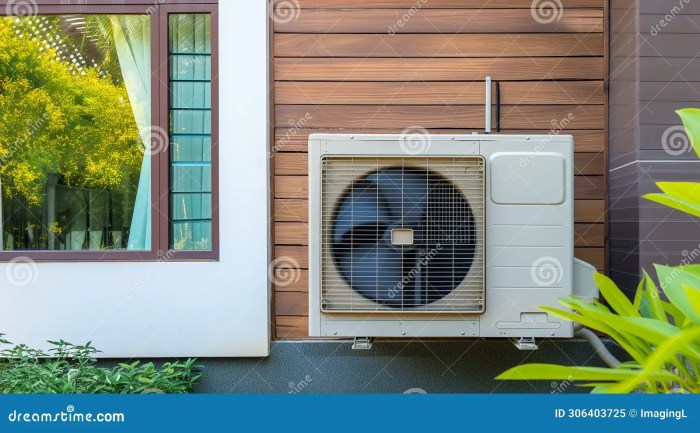Exploring the world of eco-friendly air conditioning systems for modern homes, this article delves into the key features and benefits that make them a popular choice among homeowners looking to reduce their environmental impact.
From energy efficiency to innovative technologies, we'll uncover everything you need to know about these sustainable cooling solutions.
Overview of Eco-Friendly Air Conditioning Systems
In modern homes, the use of eco-friendly air conditioning systems has become increasingly important due to the growing concern for environmental sustainability. These systems are designed to reduce energy consumption, lower greenhouse gas emissions, and minimize the overall impact on the environment.
Key Features of Eco-Friendly AC Systems
- Energy Efficiency: Eco-friendly AC systems are designed to operate more efficiently, consuming less energy compared to traditional systems. This results in lower electricity bills for homeowners.
- Use of Refrigerants: These systems use refrigerants that have lower global warming potential, such as R-410A or R-32, which are less harmful to the environment.
- Smart Technology: Many eco-friendly AC systems are equipped with smart technology features like programmable thermostats and energy-saving modes to optimize performance and reduce energy waste.
- No Ozone Depletion: Eco-friendly systems do not contain ozone-depleting substances, which helps in preserving the ozone layer and reducing the risk of harmful UV radiation.
Benefits of Using Eco-Friendly AC Systems
- Environmental Impact: By using eco-friendly AC systems, homeowners can significantly reduce their carbon footprint and contribute to a healthier planet for future generations.
- Cost Savings: Due to their energy-efficient design, eco-friendly systems can help homeowners save money on their utility bills in the long run, offsetting the initial investment cost.
- Improved Air Quality: These systems often come with advanced filtration systems that help remove dust, pollen, and other allergens from the air, creating a healthier indoor environment.
- Government Incentives: Many governments offer incentives and rebates for the installation of eco-friendly AC systems, making it a more financially attractive option for homeowners.
Types of Top Eco-Friendly Air Conditioning Systems
When it comes to eco-friendly air conditioning systems for modern homes, there are several types available that offer energy-efficient cooling solutions. Let's compare and contrast some of the top options.
1. Ductless Mini-Split Systems
Ductless mini-split systems are a popular choice for homeowners looking to save energy and reduce their carbon footprint. These systems consist of an outdoor compressor unit and one or more indoor air-handling units, connected by refrigerant lines. They allow for zoning, meaning you can control the temperature of individual rooms, leading to increased energy efficiency.
- Works by transferring heat from inside to outside through refrigerant lines
- Energy-efficient as they do not experience energy loss through ducts
- Brands like Mitsubishi Electric, Daikin, and LG are known for their eco-friendly models
2. Geothermal Heat Pumps
Geothermal heat pumps utilize the stable underground temperature to provide heating, cooling, and hot water for homes. These systems are highly energy-efficient and environmentally friendly, as they rely on the earth's natural heat instead of burning fossil fuels.
- Works by transferring heat between the ground and the home
- One of the most sustainable heating and cooling options available
- Brands like WaterFurnace, ClimateMaster, and Bosch offer eco-friendly geothermal systems
3. Evaporative Coolers
Evaporative coolers, also known as swamp coolers, are an eco-friendly alternative to traditional air conditioners. These systems use water to cool the air through evaporation, consuming significantly less electricity compared to standard AC units.
- Works by pulling hot air through water-soaked pads to produce cool air
- Energy-efficient and cost-effective cooling solution
- Popular brands include Hessaire, Honeywell, and Frigiking
Energy Efficiency Ratings and Certifications

Energy efficiency ratings and certifications play a crucial role in determining the environmental impact and cost-effectiveness of air conditioning systems. By understanding these ratings and certifications, homeowners can make informed decisions when selecting eco-friendly AC units.
Importance of SEER and EER Ratings
SEER (Seasonal Energy Efficiency Ratio) and EER (Energy Efficiency Ratio) are two key metrics used to measure the efficiency of air conditioning systems. SEER specifically calculates the cooling output of an AC unit during a typical cooling season divided by the total electric energy input during the same period.
On the other hand, EER represents the cooling capacity of the AC unit divided by the electrical power input at a specific outdoor temperature.
Higher SEER and EER ratings indicate greater energy efficiency, meaning the AC unit can provide the same level of cooling while consuming less energy. Choosing a system with high SEER and EER ratings can result in lower energy bills and reduced environmental impact.
ENERGY STAR Certification
The ENERGY STAR certification is awarded to air conditioning units that meet strict energy efficiency guidelines set by the U.S. Environmental Protection Agency. These units are proven to be more energy-efficient and environmentally friendly compared to standard models. ENERGY STAR certified AC systems can provide significant cost savings on energy bills and reduce greenhouse gas emissions.
Benefits of High Energy Efficiency Ratings and Certifications
- Lower Energy Costs: AC units with high energy efficiency ratings consume less electricity, resulting in lower energy bills over time.
- Environmental Impact: Energy-efficient systems reduce the carbon footprint of households by consuming less energy and operating more sustainably.
- Improved Comfort: Efficient AC units can provide consistent cooling without fluctuations, enhancing indoor comfort levels for homeowners.
- Long-Term Savings: Investing in an energy-efficient AC system can lead to long-term savings on maintenance and repair costs, as well as increased home value.
Innovative Features and Technologies

Modern eco-friendly air conditioning systems incorporate innovative features and technologies that not only enhance comfort but also contribute to energy efficiency and sustainability.
Variable-Speed Compressors
Variable-speed compressors are a key technology in eco-friendly air conditioning systems. Unlike traditional single-speed compressors, variable-speed compressors can adjust their speed based on the cooling needs of the space. This results in more precise temperature control, reduced energy consumption, and lower operating costs.
Smart Thermostats
Smart thermostats are another innovative feature that plays a significant role in energy savings. These thermostats can learn the household's cooling preferences and adjust the temperature settings accordingly. Additionally, they can be controlled remotely via smartphones or other devices, allowing homeowners to optimize their cooling system's efficiency even when they are away from home.
Air Purification Technologies
Many eco-friendly air conditioning systems come equipped with advanced air purification technologies, such as HEPA filters and UV lights. These technologies help improve indoor air quality by capturing and eliminating dust, allergens, and other pollutants. By ensuring cleaner and healthier air, these systems not only enhance comfort but also promote overall well-being.
Ultimate Conclusion
In conclusion, opting for eco-friendly air conditioning systems not only helps in reducing energy consumption but also contributes to a greener planet. Make the switch today and enjoy a cool home with a clear conscience.
FAQ Resource
How do eco-friendly AC systems benefit the environment?
Eco-friendly AC systems reduce energy consumption, leading to lower greenhouse gas emissions and a smaller carbon footprint.
Are eco-friendly AC systems more expensive to purchase?
While the initial cost might be higher, the long-term savings on energy bills make eco-friendly AC systems a cost-effective choice.
Do eco-friendly AC systems require special maintenance?
Regular maintenance is recommended for all AC systems, but eco-friendly ones generally require less maintenance due to their efficient operation.















